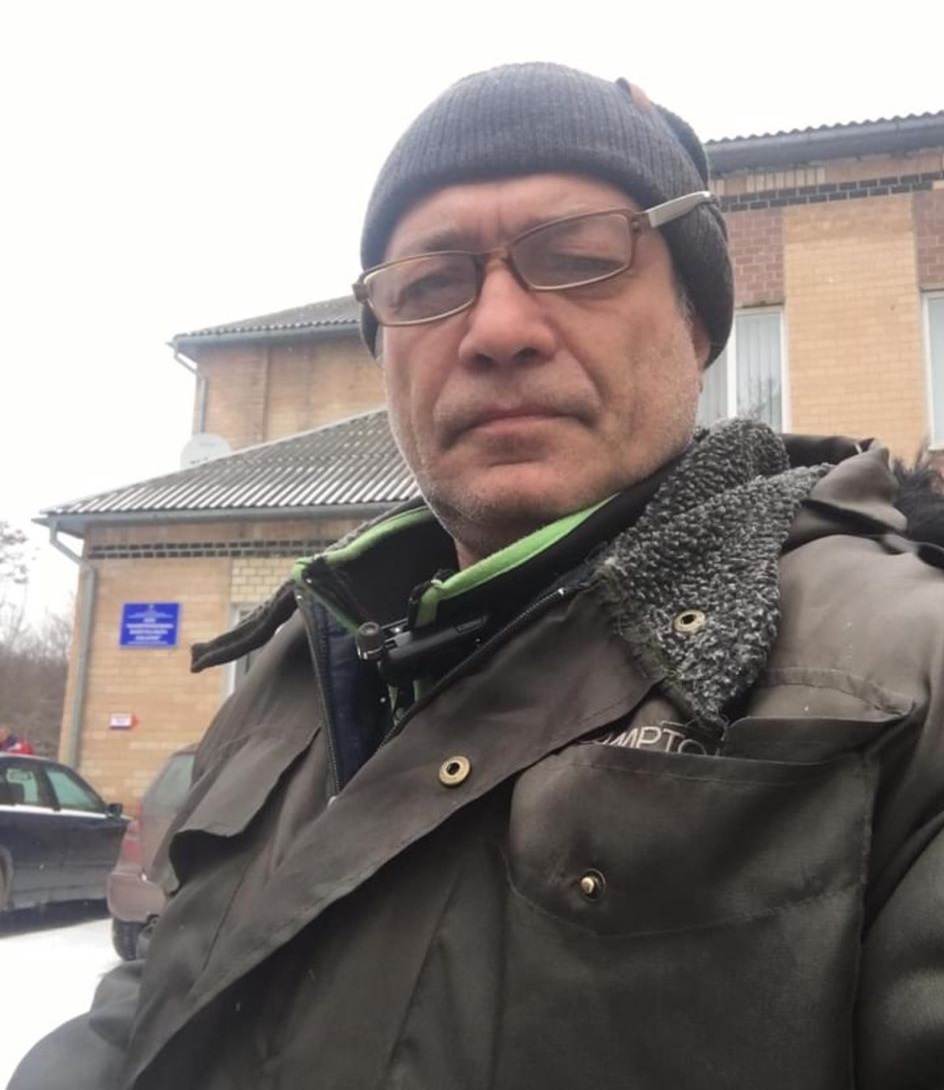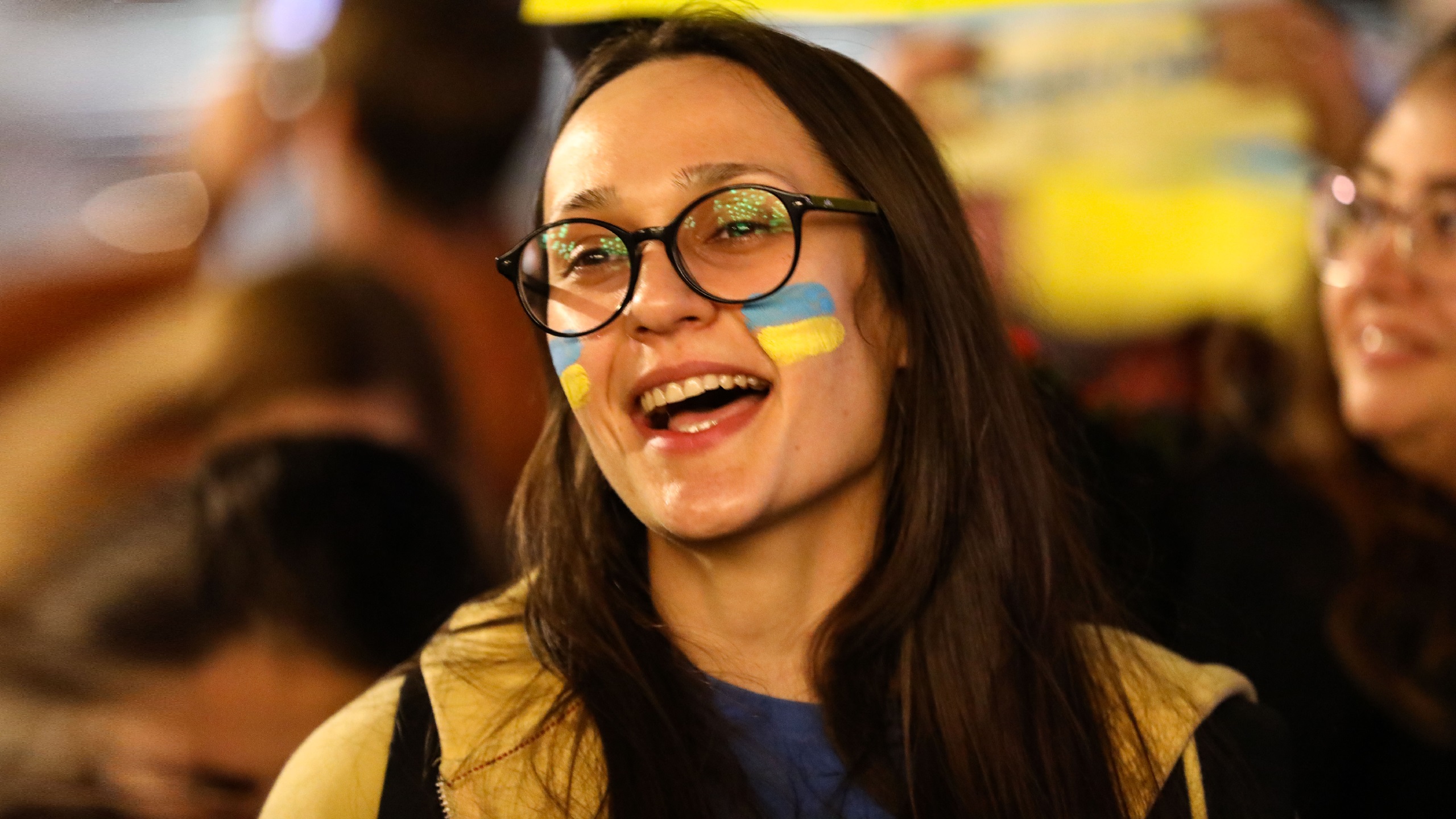Dozens of Israelis of Ukrainian origin are making their way to their ravaged country of birth, and not just to offer humanitarian aid or to try to get relatives and friends out. They are leaving behind families, work, and safety to take up arms against the Russian invasion.
They cross the Polish border, meet comrades, and head to the frontline, willing to risk death for the freedom of Ukraine. What makes these Israelis put their lives on the line for the sake of the country they left many years ago?
I managed to get one of the last tickets to Warsaw. We were 18 men heading to the war. … You have to stand up for what is right.
Mihael Ratinsky, 55, was born in Kharkiv, a city that is being destroyed by Russian artillery and airstrikes. He arrived at the Polish border on Monday, where many thousands of Ukrainian refugees are living in tents in the freezing cold, having escaped the horrors of war.

Mihael Ratinsky. (Courtesy)
“I managed to get one of the last tickets to Warsaw. We were 18 men heading to the war. Another Israeli, a few Ukrainian foreign workers who dropped their contracts and left to fight, and a guy who had almost received his Israeli citizenship – it was already being processed and in one more week, he would have gotten it. But he decided that he couldn’t wait anymore,” Ratinsky told The Media Line.
Leaving Israel to fight in what seems to be the war between Russia and the global West is not something extreme or bizarre, he says. “You have to stand up for what is right,” he smiles, adding that even his wife, who originally was strongly against him joining the fight, eventually understood why he was doing this.
At the Polish side of the border, he and other soon-to-be-fighters received plenty of supplies from Polish volunteers, and they soon met with a Ukrainian military representative who was expecting just one person, only to find that there were 18 of them.
In the western Ukrainian city of Ternopil, Ratinsky met friends – old bodies who fought alongside him against the Russians in 2014, when President Vladimir Putin annexed Crimea and created pro-Russian enclaves in Luhansk and Donetsk.
Give the gift of hope
We practice what we preach:
accurate, fearless journalism. But we can't do it alone.
- On the ground in Gaza, Syria, Israel, Egypt, Pakistan, and more
- Our program trained more than 100 journalists
- Calling out fake news and reporting real facts
- On the ground in Gaza, Syria, Israel, Egypt, Pakistan, and more
- Our program trained more than 100 journalists
- Calling out fake news and reporting real facts
Join us.
Support The Media Line. Save democracy.


“I’m here for the same reason as the last time [in 2014]. I can’t leave my friends alone. In 1991 [when Ukraine achieved independence from the USSR] Andrey and I – he is an ex-counselor to the Ukrainian health minister – raised the blue and yellow Ukrainian flag in Kharkiv for the first time. And now we will fight for Ukraine until we secure victory,” Ratinsky says.
He served in the Soviet army from 1984 to 1986. When he immigrated to Israel, he was too old to join the military.
I love Israel with all my heart, and when I need to, I take up arms to defend my country. Now Ukraine is in need; they need help.
Sergei Novitzky, 38, was born in Kyiv. He immigrated to Israel with this family 24 years ago, served in an IDF combat unit, and lived in Kfar Saba, near Tel Aviv.
“I had a chance to fight for my country; now it’s time to defend those in Ukraine. I love Israel with all my heart, and when I need to, I take up arms to defend my country. Now Ukraine is in need; they need help. I decided to help,” he says.
According to Novitzky, many Israelis are ready to join the fight. There are groups dedicated to this that are waiting for permission to travel with ammunition.
There are also native-born Israelis without Ukrainian roots but who feel solidarity with the Ukrainian people, who are ready to leave for the frontlines.
Shay Dahan, 25, just finished his mandatory army service. He recently told Israeli media that he is prepared to join the fight in Ukraine, after the Ukrainian Embassy published, and then quickly removed, an urgent call for volunteers. Many potential volunteers say and write in their social media that for them, being an Israeli and a Jew means “standing up for what is right.”
Thousands of Israelis of Ukrainian and Russian origin have taken part in several demonstrations against the war in Tel Aviv, Haifa, and Jerusalem. Volunteers in every city collect medicine, warm clothing, and baby products to send to Ukraine.

Ukrainians and Israelis who support them gather during a protest against Russian attacks on Ukraine, on Feb. 26, 2022, in Tel Aviv, Israel. (Mostafa Alkharouf/Anadolu Agency via Getty Images)
Inna Rabinovich, who was born in Odesa and lives in Haifa, says the mobilization and solidarity are total and complete, and that Russian-born and Ukrainian-born Israelis are on the same side.
Today the whole world understands who the aggressor is and who the victim is.
“In 2014 there was some division over the annexation of Crimea. Some supported Ukraine, and some didn’t. But today it seems that there is almost no division, and the involvement is so much bigger. In 2014 it was a small, distant war; now we are on the verge of something very different and more dangerous. Today the whole world understands who the aggressor is and who the victim is,” she says.
Ratinsky confirms that the flow of Israeli volunteers who want to join the fight is significantly greater than last time. He already knows the drill and has received his uniform and weapon. He is ready to serve as a soldier, a paramedic, a driver, to do anything to help.
He believes the Russians do not entirely understand the situation.
“Putin doesn’t get it. There will be plenty of blood; there will be a partisan war. It will take time, but he doesn’t have any chance of winning. All the veterans who fought against the Russians in 2014 are back and there are many others as well. The people here – Ukrainians and others who came to help – are dedicated and determined to fight. He just can’t win,” Ratinsky says.